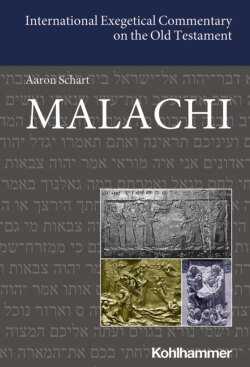Читать книгу Malachi - Aaron Schart - Страница 17
На сайте Литреса книга снята с продажи.
The Malachi Document as the Final Section of the Book of the Twelve Prophets
ОглавлениеIt is true that the Malachi document did not originate as the conclusion to the Book of the Twelve,23 but it was placed secondarily at the close of that book, and that action was deliberate. Some of the redactors who worked on the Malachi document followed that prompting and fashioned purposeful links to the preceding documents in the Book of the Twelve Prophets. The result was that readers were tasked with interpreting the Malachi document as the last link in the prophetic chain.
Haggai, Zechariah, Malachi First we should note that the last three prophets in the Book of the Twelve were regarded by the redactors as representatives of a new epoch. The dating contained in the Haggai and Zechariah documents assigned them to a time in which Israel, after the Babylonian exile, was being ruled by Persian kings and experiencing a restoration.24 In Zech 1:4 the break is clearly marked: the phase of the “earlier prophets” (hannǝbi’îm hāri’šonîm)—who had not been heard by the ancestors—is in the past; now something new can begin. The political change corresponds to an inner transformation of the people. That is to say, the people is experiencing a return to Yhwh (Hag 1:12; Zech 1:3, 6).
Addition to Zech 14 If we see the Malachi document as the conclusion to the Book of the Twelve another question arises: what is the function of this writing in light of Zech 14?25 After all, Zech 14 fulfills every expectation one might have of a brilliant closing chapter for the Book of the Twelve. It projects a grandiose scenario of the day of Yhwh, drawing together all the threads found thus far in the Book of the Twelve. In particular it resolves the problem of how the hope for a spontaneous adherence of the nations to the belief in Yhwh and hope for an end to oppression by the great powers may become reality. To that purpose Zech 14 proposes a dramatic sequence: on the day of Yhwh the nations attacking Jerusalem will be struck down and destroyed; thereafter the remainder of the nations will celebrate the Feast of Tabernacles (Sukkoth) together with the remnant of Israel.
In the wake of that utopian prospect of eschatological peace, Malachi turns back to the sorrowful present: abuses in the temple, among the priesthood and the laity, the crumbling of marriages and families, exploitation of the personae miserae, and the irritating success of the impious. This sober view of current problems makes it clear that the eschatological vision is not given in order to turn attention away from daily economic and cultic decisions in the present. Rather, its purpose is the resolution of real problems.
Individual requital The sixth disputation speech augments the vision of Zech 14 with the important aspect of “individual” requital. While Zech 14 takes whole nations and Yhwh’s dealing with them as its subject, in Mal 3:13–21 [3:13–4:3 ET] the focus is on groups to which individuals may want to belong or from which they should distance themselves.
Original connection to Zechariah 1–8? It is often proposed that the Malachi document (or one of its literary presucursors) originally connected to Zechariah 1–8, and that chapters 9–14 of Zechariah were added later. The main reason for the thesis is that, while the Malachi document displays many references to Haggai and Zechariah 1–8, there are very few to Zechariah 9–14.26 On the other hand, there is much to be said in favor of the position that the superscription in Mal 1:1 imitates the superscriptions in Zech 9:1; 12:1, with the addition of a personal name. Moreover, the generic designation משׁא is more appropriate to Zech 9–14 than to a collection of disputation speeches. If we follow those arguments, we must conclude that the Malachi document was intended from the outset to direct readers back from the eschatological depictions in Zech 14 to the problems connected to Torah observance in the present.
The frame: Hosea–Malachi It is often proposed that Hosea and Malachi constitute a frame around the Book of the Twelve.27 “In fact, what frames the collection of the Twelve Prophets is the theme of Yhwh’s indestructible love for his people.”28 Like Hosea, the Malachi document criticizes the cult. There is an especially strong link between their criticisms of the priesthood, whereby both Hos 4 and Mal 2:1–9 emphasize that the priests are not carrying out their real duty, that is, teaching the people the “Torah,” There are insufficient indications that the author of the basic Malachi document planned his own writing as a literary counterpart to Hosea, but it is quite conceivable that the Malachi document was placed where it stands because it contains formulations and ideas that can be linked to Hosea.
